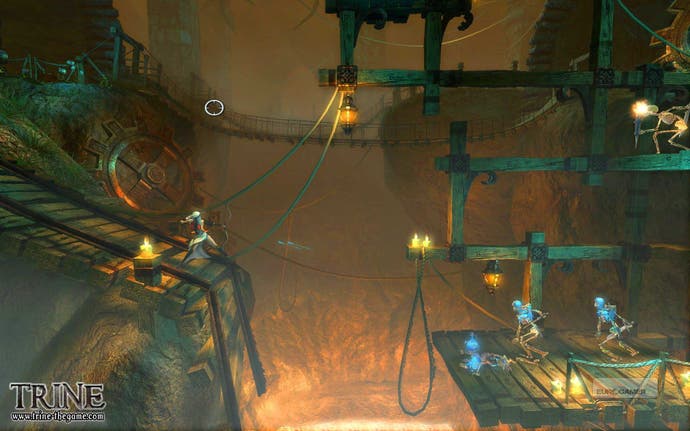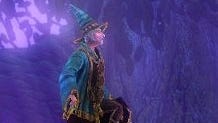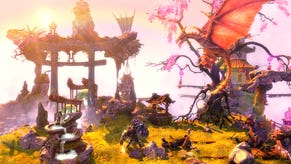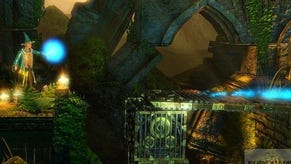Trine
Not an Australian railway simulator.
When it comes to promising new indie games, a dash of originality is usually what gets people's attention - some memorable feature or twist that helps the game break away from the herd - but in the case of Trine, from Finnish developer Frozenbyte, it's actually the warm feeling of familiarity. Certainly, anyone who's been gaming since the early nineties will find it delivers a tasty blend of beloved old flavours, served up in a tangy sauce of modern physics.
The danger when discussing such a classically constructed game, of course, is that it's tempting to rely on a soundbitey tick-list of influences to set the scene, so let's get that out of the way. The obvious reference points are the side-scrolling exploration of the original Prince of Persia and the three-way ability-based puzzling of Blizzard's cult 1992 gem, The Lost Vikings. Mash those two together, add a splash of LittleBigPlanet's physics-heavy gameplay, and you've got Trine.
You're in control of three characters. The first we meet is Zoya, a thief. You guide her through a sacred temple, in a neat opening section that doubles as a simple tutorial, until she stumbles across the Trine - a magical artefact of unknown power. Next we meet Amadeus, a wizard, who investigates the disturbance in the temple and also finds himself bound to the Trine. Finally, there's Pontius, a gruff knight whose bullish determination to defend the realm makes him the third hapless soul to be caught up in the adventure about to unfold.
From this point on you can swap between each character at will, and use their unique abilities to explore each stage. Pontius has the most obvious default ability - he's a fighter, and his sword and shield offer essential protection against the various foes ranged against you. His strength also means he's ideal for smashing through weak obstacles or cutting ropes, and he can also lift heavy blocks and throw them. Zoya, on the other hand, excels in ranged combat. Her arrows can be charged up to shoot across the screen, while her grappling hook makes her the most nimble of the trio, able to swing and swoop to platforms and areas beyond the reach of her companions.

Amadeus is mostly useless in a scrap, but his magical powers prove central to many of the physics puzzles. Click the right mouse-button on an object and you can levitate it around the screen. The left button allows you to draw objects that will appear in the gameworld. To begin with, you're restricted to summoning a simple box, but as you progress through the game you'll collect XP vials that allow you to upgrade the powers available to you. The same is true of all the characters.
It's a testament to how well balanced the game is that while the abilities develop in lots of interesting ways, they never overwhelm the gameplay. The three characters always form a neat Venn diagram of overlapping skills, all of which are intuitive in their use. Levels are linear and traditional in their side-on 2D design, but what brings them to life is the often-wonderful animation, full of lovely little touches, and a robust physics model that is central to most of the key challenges. Combined with the carefully chosen abilities of each character, the heightened reality of the environment is liberating. Sometimes the solution to a problem is obvious, but there's rarely just one way of tackling a given situation and unlikely ideas often reward the player with hidden bonus items.
It's this flexibility that ultimately makes Trine more than just a pleasant trip down memory lane for puzzle-platforming fans. Between the balanced abilities and the engrossing gameworld, it's a game where the unspoken question, "I wonder if I can..." is almost always answered in the affirmative. As a result, progress always feels delightfully organic and logical, and while it's possible to get a fair distance into the game without too much lateral thinking, those who take the path of least resistance start missing out on more and more useful secrets. Before long you're using Amadeus to conjure boxes above skeletal archers, crushing them flat before jamming the box onto deadly spikes, which provides a safe haven from where Zoya can grapple up to a hidden area, to open a chest and find a bonus item that benefits Pontius.







